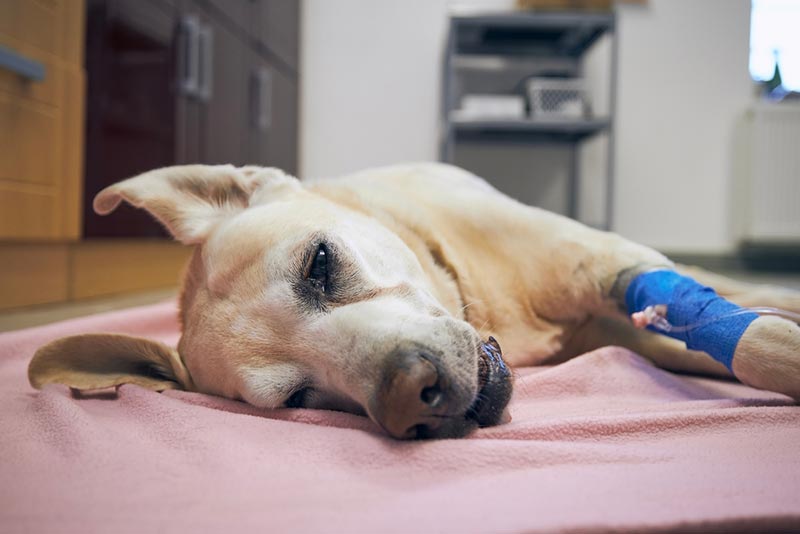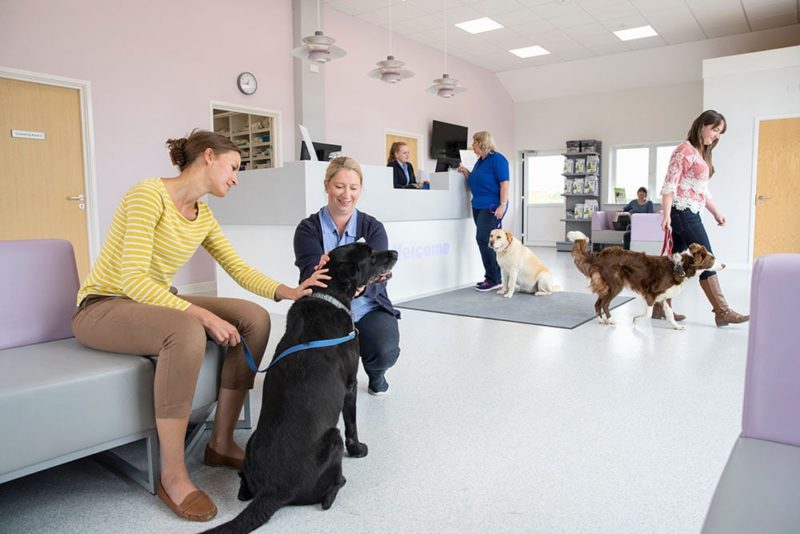What Is the Cost of Hernia Surgery for Dogs? Factors to Consider

Updated on

A common problem that dogs can suffer from is a hernia. This is when the abdominal organs push through a hole in the muscle wall. The condition can be caused by trauma, such as getting into a fight with another dog or getting hit by a car. A dog can also have it when they’re born. Most minor hernia surgeries will cost between $150 and $400. However, the price can increase to around $500 for less simple procedures.
Although hernias are relatively simple to treat—and certain umbilical hernias can correct themselves—they do require surgery. Knowing the potential cost before you take your dog to your veterinarian for a diagnosis can help you budget accordingly and keep your dog healthy.
The Importance of Hernia Surgery for Dogs
Hernias in dogs can be the result of a congenital issue or trauma, usually following a car accident.1 The hernias that your dog can suffer from are treatable but often require surgery to fix. If they’re left untreated, the organs involved can be strangled and die (soft tissue necrosis), which can be fatal.
- Diaphragmatic Hernia — This is caused when a hole in the diaphragm enables the abdominal organs to enter the chest cavity. This can interfere with your dog’s ability to breathe.
- Hiatal Hernia — This is found where the esophagus meets the stomach and is caused by the stomach pushing against the diaphragm.
- Inguinal Hernia — This is caused by the bladder, uterus, or intestine protruding through an opening in the muscle wall found in the groin area.
- Perineal Hernia — This type of hernia is most common in certain breeds, particularly intact males over 5 years old. It occurs due to a tear in the pelvis muscles, which enables the abdominal organs into the area around the anus.
- Umbilical Hernia — This is the most common hernia and a congenital one. It can be found in young puppies around 2 weeks old.
How Much Does Hernia Surgery for Dogs Cost?

If your dog is diagnosed with a hernia, regardless of the type, and needs treatment, surgery is required to fix the issue. Sometimes, if the procedure can be handled while your dog is being spayed or neutered, the cost can be lowered because the same anesthetic is used for the two surgeries. However, you will also have to pay for both the hernia surgery and the spay or neutering costs.
Unfortunately, serious hernias that require emergency surgery or have caused infections or tissue damage can cost as much as $2,000—if not more—especially if your dog experiences complications.
Overall, the price is determined by the type and severity of the hernia, whether the surgery is combined with another procedure, and where you live. Veterinary clinics in cities, for example, tend to be more expensive than in small, rural towns.
Additional Costs to Anticipate
Keeping your dog healthy requires spending money, and the cost of the hernia surgery is not the only thing to consider. You also need to make allowances for extra costs to ensure that your dog gets the treatment that they need to recover properly.
Diagnosis
Treatment starts with a diagnosis, so you’ll need to pay the initial examination fees. Some hernias are externally visible as an abnormal lump, but others are internal. However, some kinds of hernias happen internally and require diagnostic imaging such as X-rays or ultrasound exams. If you suspect that your dog has a hernia, your veterinarian will need to diagnose the issue and rule out any other medical problems before doing the surgery. The price of the exam will change depending on the methods used to diagnose the hernia.
Medication
Post-operative medication is another cost to consider. Antibiotics and painkillers will be prescribed for your dog’s recovery. Some medicines aren’t covered in the cost of the surgery, and you may have to pay $20–$30 to fill your dog’s prescription.

Overnight Stays and Follow-Up Visits
Most veterinarians will keep your dog at the clinic overnight following the surgery to make sure there are no complications. If your dog does experience complications, they’ll likely be kept at the clinic for longer. Any follow-up visits to ensure that your dog is healing well will cost extra, even if nothing is wrong.
How Are Hernias in Dogs Diagnosed?
If your dog starts exhibiting strange behavior or showing signs of pain, it’s always a good idea to take them to a veterinarian as soon as possible. Certain hernias are externally visible as an abnormal lump but others are internal. Some hernias can be severe and lead to infection or necrosis (tissue death), so the faster you get them diagnosed, the better. The signs to look for include swelling, pain, vomiting, appetite loss, and redness.
Your veterinarian will use various tools to rule out other medical conditions and diagnose your dog’s hernia. Most of the time, a physical exam is enough to determine where the hernia is and what type it is. However, depending on which type of hernia your dog develops, your veterinarian might need to use several other diagnostic tools.
Your veterinarian may use X-rays, blood work, and ultrasounds to determine the location and severity of the hernia. The diagnosis will also determine how the condition is treated and whether it’ll heal on its own, like certain umbilical hernias, or if surgery is necessary.
Does Pet Insurance Cover Hernia Surgery for Dogs?

Pet insurance helps you cover unexpected veterinary bills, and many policy providers do cover hernia surgery. The type of plan that you have will affect how much of the cost the insurance covers or whether hernias are covered at all.
Accident-and-illness plans will cover all five types of hernias, though you should double-check with your policy provider to make sure of this. If you have an accident-only policy, you’ll only be covered for hernias caused by trauma.
Your dog’s age when you take out a policy can play a part in your coverage too. If you take out a policy after the accident that caused the hernia, most policies will consider it a pre-existing condition. In this case, no policy provider will cover the diagnosis, treatment, or recovery costs at all.
Can You Prevent Hernias in Dogs?
It can be difficult to prevent your dog from developing a hernia. Congenital hernias cannot be prevented because it’s an issue that your dog is born with.
For hernias caused by trauma, prevention relies on keeping your dog as safe as possible. Keep your dog leashed whenever you’re out on a walk, and ensure that they will obey recall commands, especially in dog parks that aren’t fully fenced. You should also make sure your home is as safe as possible by regularly checking fences and gates that your dog could escape through.
Conclusion
Unfortunately, hernias in dogs rarely correct themselves and often require surgery to treat properly. The surgery itself is relatively simple, but the cost can vary from $150 to $2,000, depending on the type of hernia that your dog has, its severity, and where you live.
Depending on the type of hernia, it can be a life-threatening condition for your dog. A quick diagnosis and surgical treatment are essential to keep your dog healthy.
Featured Image Credit: Jaromir Chalabala, Shutterstock













